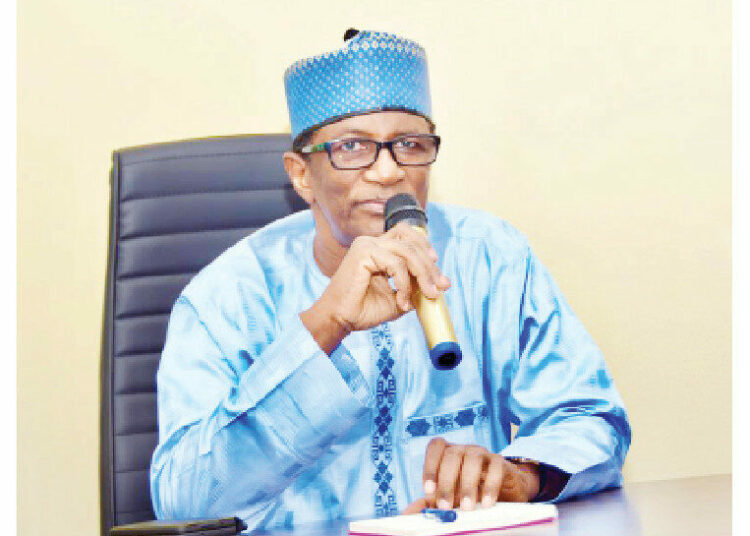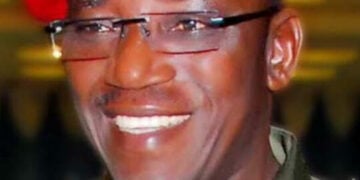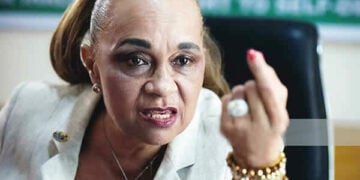Nigeria faces escalating climate change threats—rising floods, extreme heat, and desert encroachment—- part of what the National Agency for the Great Green Wall (NAGGW) is struggling to combat. The NAGGW’s Director-General, Dr Saleh Abubakar shed more lights on the efforts of the agency in discharging its duties insisting that urban forestry must be integrated into city planning as a frontline shield to protect vulnerable communities and foster sustainable, climate-resilient development.
You have warned that Nigeria is heading toward an environmental and health crisis without urgent action. What does this mean in practical terms for ordinary Nigerians today?
To an average Nigerian, this means displacement, it means loss of livelihood and in most cases very harsh unfavorable environment. So in a nutshell, we are facing a climate crisis and this climate crisis can be taken care of by being so aware of the environment. We have to do our own well to take care of the environment so that we can all leave in peace and in harmony with the region.
Many government policies in the past have remained on paper without effective implementation. How can Nigeria ensure that integrating urban forestry into city planning does not suffer the same fate?
Well like I said, we have a clear mandate of what we are supposed to do and we do them religiously. We have another policy added and this one is being driven by the honorable minister of environment, that’s a private forest that individuals can own their own forest they can develop it and we can develop it. They can plant or raise trees for timber for example, raise food trees, we can raise different types of trees, but yet still it’s privately owned.
With rapid urbanisation and population growth, developers often priorities profit over sustainability. How can the government compel private developers to comply with urban forestry guidelines?
Guidelines are always violated by so many people but, we have the enforcers who take care of this to make sure that all laws are obeyed.
Flooding and extreme heat are already affecting Nigerian cities. What short-term measures can be taken immediately to protect vulnerable urban communities?
Some of these things are natural disasters, they happen but of course we have our way of mitigating them. For example, there are times that in some semi-arid regions of this country that we might have too much rainfall, so you could find flooding in such cases. Most of these lands are flat lands where we don’t have lands where water can run up and find its coast, so this is why most cases, we find flooding in areas like Yobe, parts of Borno state, and there are also things people do. That is they block their drainages and damp refuge in drainages, all of these things can block the pathway of the water that should go down through the gutters, so you eventually find this water getting into people’s houses.
You recommended that every house have four trees, which is laudable, but some critics may see it as unrealistic in cities like Lagos and Abuja. How do you respond to such concerns?
Well you only do it where it is possible, like Lagos, we can say it is already a forest state, the land is small because there’s a large body of water in Lagos. In Abuja too, people can plant trees, of course why not? Where this is most needed are on the fringes of the Sahara Desert and northern parts of this country. We have the eleven states, and we call them the frontline states, where we do this planting, deliberate planting of course to halt desert encroachment and to give life to lifeless or dry lands.
Nigeria has signed several international agreements on climate action. From your perspective, how well is the country living up to those commitments, particularly in the housing and urban development sector?
We have cooperation with some countries, where we present a common ground when we get to some of these international fora where we make agreements like you said. We have signed so many of them. We are working on the concept mode now, we can deliberately agree and form a common front.
The NAGGW recently marked 10 years anniversary. Talk to us about the milestones achieved so far
Well the birthday celebration was done in Jigawa state and this is as well as launching our 5 million date palm seedlings as well scaling up of the date palm seedling plantation to 50 million between now and the year 2030…. 10 years of course in the life of any organization is not so much, we started from a very humble beginning where we plant a few million trees every year, but this year we became ambitious of not only starting planting 20 milllion trees we said we would, because this is the target we set, between now and 2030, this Agency will spearhead 20 billion trees in this country. Now we’ve started with 5 million death palms, we have already distributed them in about eleven States of our activities and we will scale that up to 50 million by the year 2030. The trees will include fruit trees, other trees that we are losing some of them like tarmarines, you don’t even find them like that anywhere, we have THE seedlings of sweet tarmarine for example and so many of this. We are just trying to scale up production and distribution to the people so that they can get into production as well as nurturing them.
What is the enormity of the threat climate change poses to the world? Let’s bring it down home. How does that affect Nigeria?
Very serious because I come from a place where climate change is real, I’ve seen it growing up and I know what is happening now, I know if you in Yobe about drying up, I know of desert encroachment in my backyard, this I’ve watched recently . I was there and I know what I use to see as a forest before is now an open land, I know what the pastoralist are facing, they’ve lost their pastures, they’ve moved out to other locations or country, this is also creating this farmer herder clashes. People have lost jobs, they have lost houses, villages buried, relocated and people are affected by this, I see it, I know it. I feel it because I know these things first hand.
You mentioned Katsina, what other states do you have that are corporate with you?
All the 11 states we are working now, are giving us the maximum cooperation that we need. We are working with them hand in hand and their ministries of environment. We are doing great together with them.
Any plan to add more states?
Yeah, some states have written but we’ve advised them to get to the NASS because we are created from an Act of the NASS. So they can join but we have advice they should channel the process through the NASS so that they can be considered as part of the great things we are doing.
Nigerians have a lukewarm attitude towards tree planting, and then there is the concern about the increasing use of charcoal. How much of a threat is this to the sustainable environment, and what is the NAGGW doing to discourage tree felling for charcoal?
These we are working together with the state governments, they are the ones to set the laws. Of course there are laws in the states against try felling, especially indiscriminate tree felling. Some go for this tree felling in the night, some make charcoal and some even export the timber out of this country. So the states has the enabling laws to catch the offenders and give them appropriate sanctions. What we are doing is trying to educate the people. We try to tell them everywhere we go that their lives depends on the environment. If the environment is so harsh and bad, they can’t even live where they staying especially those on the precarious areas I’ve mentioned like.





